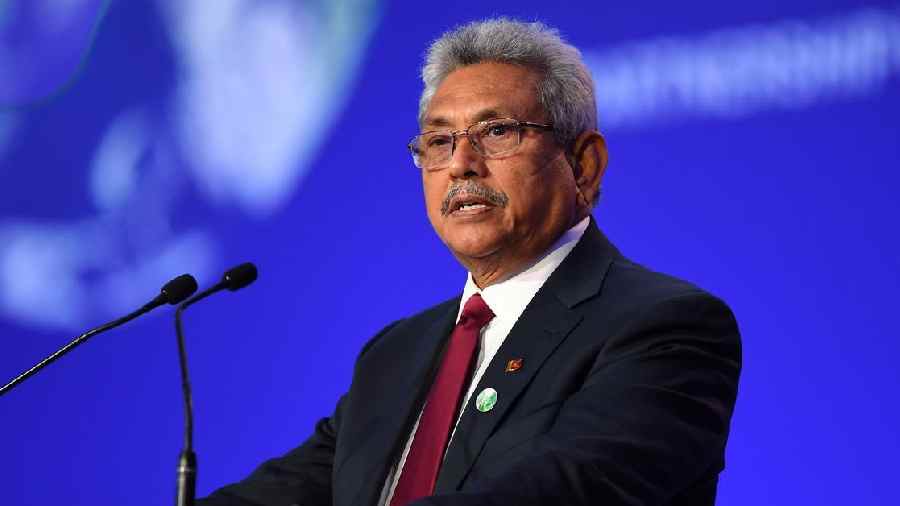Be it in the UK, Sri Lanka or any other place, when socio-economic grievances fail to be tackled appropriately by power-holders, the prospect of the people raising their voices against them cannot be ignored.
The tragedy is that leaders, virtually the world over, are known practically to never ever acknowledge the mistakes they may be making, the wrong policies they may be pursuing socially, diplomatically, politically, economically and so forth. When people decide and choose to exercise their power as they have in Colombo, all “strategies” of curbing the same can burst like a bubble. The Sri Lankan crisis is likely to remain a classic illustration for a long time of how “power-holders” can be forced to give in to aggressive command displayed by the common people’s “power”. There is a limit to which rhetoric resting on false promises can convince people frustrated by socio-economic problems troubling them. Of course, the nation-wide protest movement may not have literally succeeded in pushing power-holders out of office if people, rising over ethnic barriers, had not collectively responded to call of active protestors through, reportedly, means of online communication. Socio-economic grievances played a major role in adding to the negative image of the Sri Lankan President and Prime Minister, their criticism, demand for their resignation and so forth. However, hard power-holders try to spread their positive image among people, their attempts carry little significance against communication strategies at play, uniting the people as visible in Sri Lanka. What command can a few individuals’ communication-measures have against that of thousands, apparently guided by a specific agenda? Clearly, it may not be wrong to say that when people choose to engage in “war”—without weapons—even the most “powerful” in their country can fall weak against them.

Interestingly, the United Kingdom has also witnessed the dismissal of Prime Minister Boris Johnson from office, though of course without people taking to the streets and protesting as they have in Sri Lanka. Nevertheless, what cannot be missed is Johnson being repeatedly targeted by the British media for the problems faced by the people. Be it the Covid-phase, the country’s economy, strikes and several other issues, he has been “reportedly” blamed as responsible for these and also not paying due attention to these problems. There seemed to be no end to frequency and a degree of aggressiveness in these. Having sailed through an attempted no-confidence motion against him, Johnson seemed apparently little bothered about these till hit by the resignations of some of his Cabinet members. He was left with no option but to resign, remaining in office till the election of his successor.

Undeniably, Johnson and his Cabinet could not afford to remain unmoved by criticism showered on their policies by their rivals, people and naturally the media. This also suggests that he and his team kept a close eye on the impact of their moves, the nature of their image—particularly that of Johnson—among the people and in the media. Perhaps, Sri Lankan leaders erred on this front. Without doubt, even Johnson chose to be unmoved by criticism for a considerable period of time and may have still adopted an apparently “casual” approach towards the same, if probably intra-party factors prompted his minsters to assert their stand against him.
Johnson has been spared criticism linked with the NATO’s ordeal over the Ukraine-crisis. However, United States President Joe Biden has not been, in certain sections of American as well as British media. Perhaps, being the President of a superpower, globally, Biden is well aware of the diplomatic advantages on his front. Or maybe he is not in keeping with what his image as head of United States commands him to. This naturally raises several questions in keeping with his political and diplomatic image at home (nationally) and globally. He certainly is not oblivious of his popularity sinking considerably. Speculation is circulating about him being too “old” to carry on, he should “retire” and so forth.
To a degree, unlike Johnson, Biden has not been oblivious of the negative news about his battered image even within his own party. This implies that he has accepted the battering his image has got, while no such acceptance appears to have come forth from Johnson. Here, some credit must be given to the numerous surveys being conducted by various polls in the United States, with some keeping a close eye on inflated figures being circulated about Biden’s negative image. Some attention has also been paid to his party members not paying attention to boost his image. Notwithstanding these deliberations, what perhaps cannot be missed from the global as well as Indian perspective is that both Biden and Johnson have not any taken controversial step against any “negative news”. To a considerable degree, media retains its freedom in these countries, at least as this suggests.
Be it in the UK, Sri Lanka or any other place, when socio-economic grievances fail to be appropriately tackled by power-holders, the prospect of the people raising their voices against them cannot be ignored for too long. People cannot be expected to err repeatedly by supporting erring leaders again and again. Even strategies of curbing the means of communication cannot always succeed particularly when people have problems staring at them. It is not without reason that Biden is not expected to contest for a second term; or that the British Prime Minister and the Sri Lankan President have been shown the exit door. When leaders err, chances of their holding on to the reins of power are limited.
Nilofar Suhrawardy is a senior journalist and writer with specialization in communication studies and nuclear diplomacy. She is a writer of several books.

